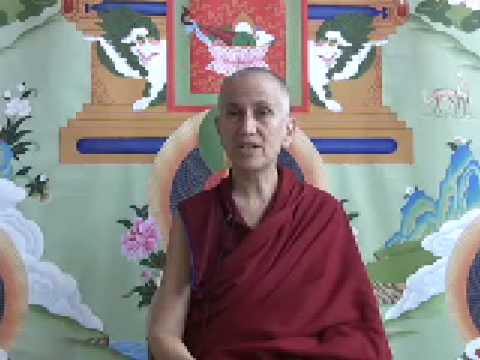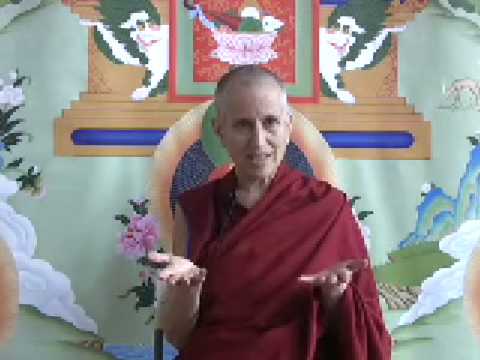Verse 32-2: Working with sickness
Part of a series of talks on the 41 Prayers to Cultivate Bodhicitta from the Avatamsaka Sutra (the Flower Ornament Sutra).
- How to deal with the mind when we’re sick
- Thinking that what we are experiencing is a result of our karma
41 Prayers to cultivate bodhicitta: Verse 32-2 (download)
“May all beings be free from illnesses.”
This is the prayer of the bodhisattva when seeing someone sick.
I thought I would pause a few days on this one and talk a little bit about how to relate to illness.
Yesterday, I was saying that illness was a given, because we have a body. First I will start talking about how just to deal with the mind when we are sick now. Later we’ll get on to talking about the whole thing of having a body and what that means. Let’s just start with the simple stuff. Comparatively simple.
First, thinking when we are sick, when our body doesn’t feel well, when it’s not doing what we want it to, when it’s aging, and so on, we should think, “This is a result of my karma.” When we experience suffering and discomfort it’s the result of destructive karma that we have created, and so therefore a very good way to deal with it is simply to say it’s the result of my karma. There’s no sense getting aggravated, angry, desperate, or depressed. The causes were created by my self-centeredness. Now I am experiencing them. Since my self-centeredness was what made me create the cause, from now on I am not going to follow it and I am going to let it go, because I don’t want to create any more of that cause. In doing so—what happens by thinking like that—is we are in fact letting go with the self-centeredness. If we don’t think like that, it would arise and say, “This is unfair, why do I to have to get sick? Those people who sneezed gave me what I have, the people wouldn’t wash the food properly, and then all these people who aren’t taking good care of me. They don’t give me enough attention. They give me too much attention.”
Have you ever noticed that some people when they’re sick, they hate being around other people, they just want to be left alone. Other people when they are sick, they want people to come and bring them soup and bring them tea. Of course whichever kind of person you are, you expect everybody else to know it and to conform with it. If you’re a left-alone kind of person then, when people come out of their kindness and compassion to bring tea or soup and to check on you, you get mad at them, which is a product of the self-centeredness. Or if you’re a person who likes to be taken care of when you’re sick and people think that you’re a person that doesn’t want to be and they don’t come, then you get angry at them. “They’re neglecting me, they are so selfish, they don’t think about me.” Then that’s another factor of our self-centeredness and in both ways we are creating more negative karma. It is interesting. Isn’t it? Who likes to be left alone when they are sick? Who likes to be taking care of? Then there are a few people who are both. It is interesting, isn’t it? How we expect everybody else to know what we want and so we say we want to be left alone. Then people leave us alone and then after a few days we are so hungry!
You can see that by thinking “this is a result of my karma,” then it stops that self-centeredness which so easily takes over when we’re sick, and runs the show, and creates more negative karma. It also helps us subdue the self-centeredness after we recover so that under the influence of self-centeredness we don’t do other negative actions that bring on more illness.
Now this karma that we have created under the influence of self-centeredness and self-grasping, it wasn’t necessarily created in this life. It could have been created in previous lives. I don’t adhere to this kind of new age thing of “You make yourself sick because you’re so negative.” I think that is a way of blaming somebody, blaming the victim. Rather if we think that the karma could have been created in previous lives, we’re in the same continuum as that person but we are not exactly the same person, so we can learn. We experience the results because I am the same continuum. But we don’t blame ourselves in this very self-grasping way. We are just taking responsibility and then we change our behavior in the future.
[In response to audience] What do you do when self-centeredness is the illness? Then you meditate on all the meditations for developing bodhicitta. Then you do all the seven-point instruction of cause and effect, equalizing and exchanging self and others. You do those very, very intently. When I say that we don’t follow self-centeredness in the future as the result of learning from our illness, it isn’t just a thing of squishing our self-centeredness. It’s a thing of eliminating it, by developing wisdom through either of these two ways.
Venerable Thubten Chodron
Venerable Chodron emphasizes the practical application of Buddha’s teachings in our daily lives and is especially skilled at explaining them in ways easily understood and practiced by Westerners. She is well known for her warm, humorous, and lucid teachings. She was ordained as a Buddhist nun in 1977 by Kyabje Ling Rinpoche in Dharamsala, India, and in 1986 she received bhikshuni (full) ordination in Taiwan. Read her full bio.


